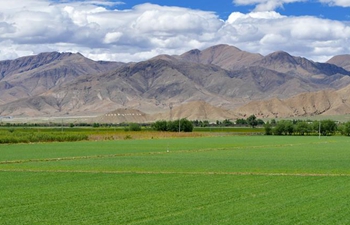by Apra Vaidya, Zhao Xu
NEW DELHI, June 26 (Xinhua) -- With more than 150 children dead and many more infected by the outbreak of acute encephalitis syndrome (AES), the eastern Indian state of Bihar has hit the headlines over the past few weeks.
The infected children were admitted to Sri Krishna Medical College and Hospital (SKMCH) and the Kejriwal Hospital in Muzaffarpur district of Bihar.
The central government sent teams of specialized doctors from Delhi to Muzaffarpur to assess the situation and find the causes of the disease.
Dr. Arun Shah, a Muzaffarpur-based pediatrician who has done research on AES said, this year there has been an epidemic of AES. "It is not a new thing as the outbreak has been recurring since 1995, with varying degrees of severity. The outbreak begins in May and attains its peak form in June, which coincides with the harvesting season of litchis," he said.
The children from the marginalized section of the society who are malnourished are at a greater risk of AES, Shah told Xinhua. "Malnutrition triggered by the consumption of unripe litchis by the malnourished children in the orchards are making them infected."
Dr. Shah said "The children belong to the poorest of poor class in the affected villages eat unripe litchis during the day and they don't get to have dinner after reaching home because they lack the means for full meals. The unripe fruit contains a high concentration of the toxin called methylene cyclopropyl glycine (MCPG) which triggers hypoglycemia (lower blood sugar levels) if consumed by a child with a malnourished body. These children play out in the day and sleep in the night without eating anything and, typically, they fell ill the next morning in the early hours with serious symptoms."
He added "The root cause is not litchi itself because the fruit has been consumed since several decades and it hasn't caused any harm. The most important thing is the chronic malnutrition in which the children have very poor glycogen storage in the liver and they are unable to maintain the blood sugar level. When there is a shortage, the process further produces toxins and if the children are sleeping without food, it affects them in the morning."
According to him, chronic malnutrition is a "predisposing factor triggered by consumption of unripe litchi by hungry and starving children."
Children belonging to well-to-do families who eat litchis are not vulnerable to AES, he added.
Shah also said that the outbreak of the disease can be prevented by taking certain precautions like by not allowing children to play in the orchards in this season or not allowing them to sleep without food and in case, AES symptoms are detected, then within four hours of the onset of it the children should be administered with glucose.
He stressed that the government needs to manage the malnourishment in a war footing and the nutritional status of the deprived children needs to be improved.
There has been widespread outrage and protests at the apparent callousness or shortcoming on the part of both the state and central governments in dealing with the situation.
The Indian authorities are rushing special teams of doctors to the affected areas in Bihar to contain the disease.
According to the experts, the disease mostly affects children below 15 years of age and symptoms of AES are acute-onset of fever, a change in mental status -- confusion, disorientation, delirium, or coma -- and the onset of seizures.













